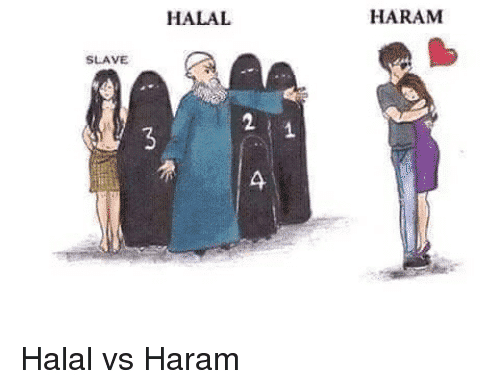Is it ever occurred to you to inquire as to what the term “haram” means? Haram is a noun in Arabic that refers to something that is prohibited or illegal. Islam prohibits Muslims from investing and engaging in transactions including pork, alcohol, gambling, and pornography in the context of Islamic financial transactions. Halal is the dietary alternative to haram.
What does haram mean?
Haraam The term “Haraam” refers to something that is ‘forbidden,’ as in ‘not allowed.’ Haraam is a Muslim’s term for anything that violates the Qur’an’s prohibitions or results in sin. Take, for instance, the crimes of adultery and murder, or the wealth derived through deception or theft. Additionally, it can be used to describe forbidden foods and beverages, such as pork or alcohol.
When used this way, it can also signify, “what an embarrassment” or “what a tragedy” in Arabic. A particular tone is used to pronounce this word.
Halal According to Islamic law, Halal is the antithesis of Haraam, which is considered forbidden.
Most non-Muslims are familiar with the term “halal meat,” which refers to meat killed in accordance with Islamic law.
A harim, derived from the same root, refers to the female sanctuaries in structures.
It is illegal in Islam to practise usury, take interest, or commit forbidden acts, but the term Haraam (with double a) signifies everything else that is forbidden.
The Arabic term for “forbidden” is haram. Anything that is considered haram by the Islamic faith is referred to as such. Antithetical to halal.
The religious term haram
Alcohol and pig are examples of haram foods, as are halal foods that have been tainted in some way, such eating meat that has been killed in a non-halal manner.
Abstaining from voting in general elections in cases of adultery or abuse.
“Haram” was also used to describe money earned by deception or depravity. As a case in point, if you’ve made money by deceiving, lying, or stealing from someone else, then you’re breaking the law. In Islam, profiting from such a blasphemous conduct is strictly forbidden for Muslims. A Muslim is not one who profits or lives off of the riches of others.

What is haram in Islam?
Haram is an Arabic word that signifies “forbidden” or “safeguarded.” If we go back to the fundamentals of Islam, we find the assertion that there is only one true God, and His messenger is a man named Muhammad.
As a result, it follows that:
One of the most important aspects of Islam is that it prohibits any activity that relies on the presence of a deity, save for those that are mandated by Allah via his prophet, Muhammad.
Humans are free to commit any and all activities that have no link to God, god, or other supernatural beings, and they can choose whether or not to do so. Those activities, however, which Allah has clearly condemned via his prophet, Muhammad, is an exception.
Haram foods
It is banned in Islam to use the Arabic word “haram” (forbidden). Quranic and Sunnah prohibitions on haram actions are found in religious books. Though anything is haram, even if the aim is good or the goal is noble, it is still forbidden. To better comprehend God’s intention, food restrictions are a part of Islamic law.
Muslims and their food Flowing blood are banned by Islamic law, therefore what may Muslims consume and what should they stay away from? Haram meats, such as pig, dog, cat, monkey, or any other haram animal, can only be regarded permissible in emergency situations, such as when a person is starving and the meat is necessary to preserve his or her life. However, if his community has an abundance of food, such meat is not regarded as necessary or lawful.
All lions, tigers, wolves, dogs, and cats with fangs are haram. There are no birds with talons that are considered haram in Islam. Domesticated donkeys are forbidden in Islam. Haram animals, such as mice, scorpions, and snakes, are forbidden. All lizards, snakes, frogs, and rodents are considered haram in Islam. Any animal that has died or has not been properly killed according to Islamic law is haram. Slaughtering animals in the name of anything besides Allah is forbidden.
Khamr, or intoxicants, are forbidden in Islam. Trading, exporting, importing, and gifting intoxicants were all outlawed by the Prophet, even with non-Muslims. It is forbidden for a Muslim to operate or own a place that carries out the sale of alcoholic beverages. Tobacco, paan, dokha, and khat are among the other intoxicants included in this category, in addition to alcohol. In other countries, a Muslim isn’t allowed to drink alcohol at all. All intoxicating drugs, including heroin, cocaine, and marijuana, are strictly prohibited.
Gelatine, nutmeg, asafoetida, and even vanilla extract are off-limits because they include alcohol (in the case of the vanilla extract) or contain other prohibited substances, such pig parts (gelatine). Because it includes nutmeg, vanilla extract, and gelatin, most confections are off-limits.
Haram is defined as anything manufactured from a human body component. (However, L Cysteine, a melting human hair derivative, is used in all commercial biscuits.) Moreover, most of the world’s supply originates at the Hindu temple of Tirupati, where the hair has been dedicated to the Hindu deity.
Examples of major haram actions in Islam
The following are some of the prohibited (haram) activities cited in fiqh books:
- Using more water than is required for wudu’ or ghusl
- A wealthy person consuming the flesh of an animal slaughtered to fulfil a promise (nazr),
- Refraining from saying “Yarhamukallah” to someone who has sneezed and then uttered “Alhamdulillah.”
- consuming alcoholic beverages,
- Making a show of oneself for anybody other than Allahu ta’ala,
- Taking an oath in any other name than Allahu ta’ala,
- Naming mankind after Allahu ta’ala’s names, such as Rahman, Quddus, and Khaliq
- Kissing your friend’s hand,
- Exposing your awrah and inspecting someone else’s awrah [a man’s awrah is the area between his navel and knees, while a woman’s awrah is all areas of her body save her hands and face],
- Lending money to the grocer and buying groceries from him (for free) until the loan is repaid (by way of the purchases you have made),
- A lady walking out without a hijab and her close family approving of her actions,
- Using something in another person’s possession without the owner’s permission and then returning it to its proper location,
- Demanding the prospective groom’s bride price,
- Fasting on the first day of Eid al-Fitr as well as the first, second, third, or fourth day of Eid al-Adha,
- Consuming meat from an animal slain without Basmala or murdered by unbelievers without a holy scripture,
- Adoring and appreciating bid’at devotees (religious innovation),
- A person begging for money despite the fact that (s)he has a day’s food and receiving alms despite the fact that the giver is aware that (s)he has a day’s food,
- Using false remarks to praise a Muslim,
19. consuming beer, kumis, and kephir
- Using someone else’s work without compensation,
- Upsetting a person by concealing his or her belongings for the sake of a joke,
- Believing that a dangerous disease will invariably spread from one person to the next,
- Allowing a kid to do, eat, or drink anything that adults are not permitted to do, eat, or drink,
- Allowing insanity or little children who will bring impurity (najasat) into the mosque.
- Creating a drawing of an animal or a human,
- Placing a photograph of a living being (an animal or a human) above the waist level,
- Begging from the jama’at by wandering among them and almsgiving to such a beggar,
- Bringing flowers or a wreath at a funeral and bringing items associated with sadness,
- Bringing the body inside the mosque [even for the purpose of praying Salat al-Janaza for it],
- Saying the Salat al-Jumu’ah and Salat al-Eid khutbas as if delivering a speech,



